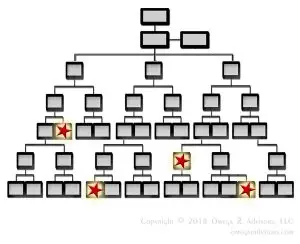The Accountable Role Of Followers In The Leadership Process
- Leadership, The Secret
- Leadership, The Secret (Pt 2): Training Implications
- Leadership, The Secret (Pt 3): Leader as Actor
- Leadership, The Secret (Pt 4): Leadership Riddle
- Leadership, The Secret (Pt 5): Persona
- Leadership, The Secret (Pt 6): Scientifically Unproven
- Leadership, The Secret (Pt 7): Experts, Research & Beauty Contests
- Leadership, The Secret (Pt 8): Top Rule Violator
- Leadership, The Secret (Pt 9): Problems Defining & Studying
- Leadership’s Secret Physical Characteristics
- With More Power Less Empathy
- With More Power Less Thinking Occurs?
- Trump and Hillary Showing the Lawlessness of Leadership
- The Accountable Role Of Followers In The Leadership Process
Where does leadership play out? It’s in the minds and hearts of followers. Followers make leaders. Yet, no training exists on the role of followers in the leadership process.
Yes, goals, policies, rules and handbooks exist. These are about being a good employee. What does being a good follower mean? Is it just a matter of doing as told, pledging blind loyalty to the leader? Or, is it more? If so, what?

What is the role of followers in the leadership process? What makes a good follower?
Good Followers Beget Good Leaders
This is not new. It’s like a good citizen in a democracy. An informed one is a better one. A better citizenry yields better leaders. Thus, a better workforce can yield better leaders.
Right, employees don’t elect their leaders. On the other hand, one who does not fit the culture won’t end up rising to be a leader either. Also, boards and executive teams don’t choose leaders from outside who don’t fit the culture. Thus, by way of culture, employees play a role in selecting leaders.
No Accountability For Employee To Make Leaders Better
Take a micro example. If a department does not like its leader, that leaks outside the department. It compounds. It affects the leader’s status. She loses clout. She loses in budgets. The department loses. Each employee loses.
So, what accountability do followers have in working to make this leader better? It’s simple, none. That’s leadership training today. If we can’t have leaders without followers, how can we have leadership training that does not train followers?
No Leadership Training For Followers
It’s all about leaders either being coaches, consultants, servants, listeners, mentors and more. What are followers supposed to be?
As evidence, listen to Barbara Kellerman, a lecturer from Harvard on public leadership. She discusses what she calls followership and the “leadership industry”:
https://www.youtube.com/watch?v=nIo5_eJs5-Y
Video length: 11:44
Beginning With Role Of Followers In The Leadership Process
Solving this begins with defining what a good follower means in the culture. Questions like these can help:
- How supportive, from blind loyalty on one end to disagreeable on the other, should an employee be?
- When is it better to discuss concerns about a directive in public, private and not at all?
- What role do they have in working to make the leader better? How should this be done?
These questions also show just how far today’s leadership training is solely focused on leaders, not followers. In that world, the leader is all. The follower is just a resource to influence, inspire . . . or manipulate.
Note: I want to give a special thanks to Maria Katsarou, of Leadership Psychology Institute (LPI), for suggesting Kellerman’s work to me.


